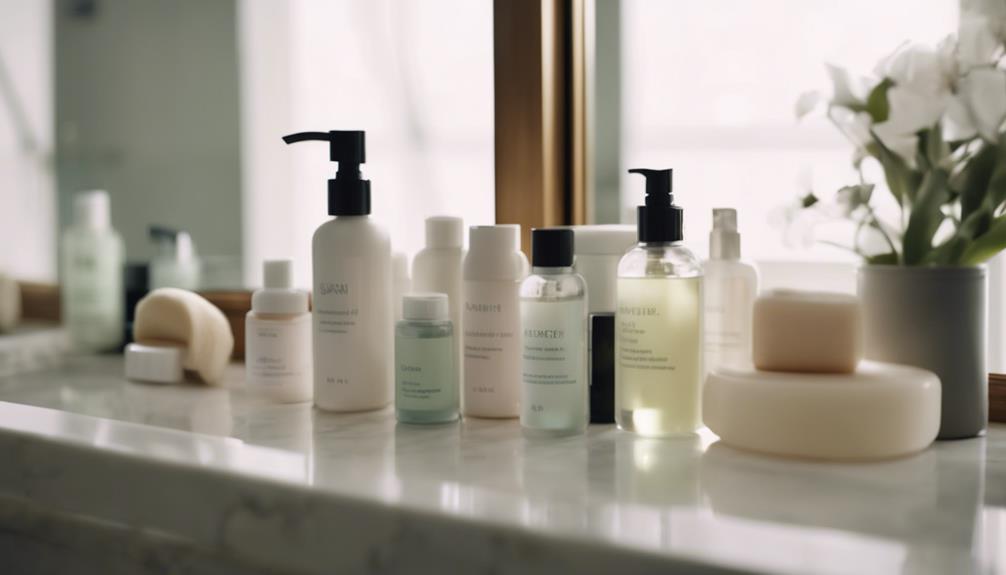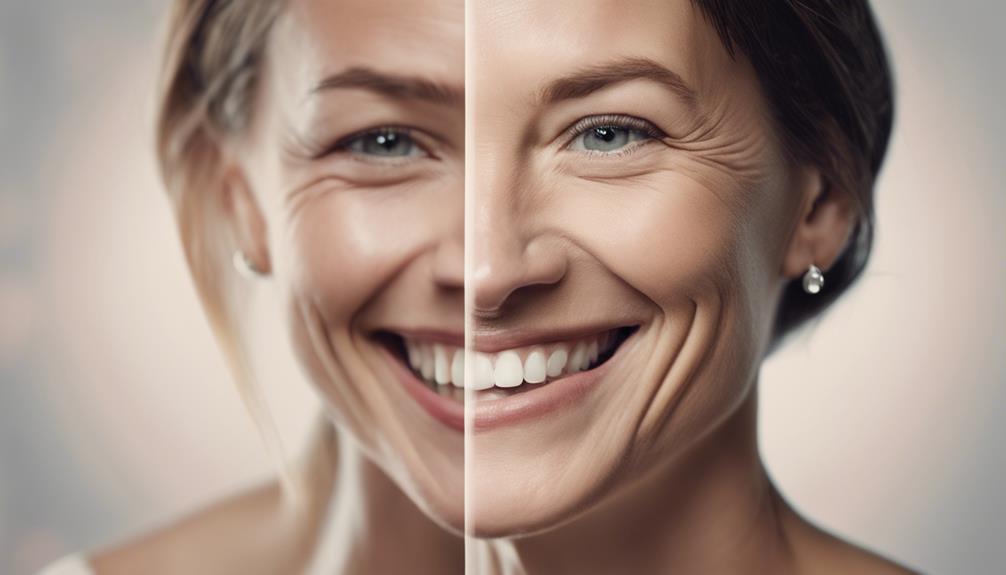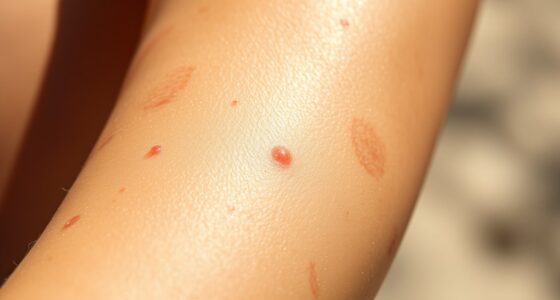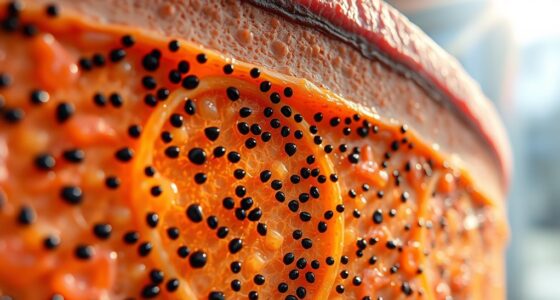To treat and prevent acne, start with a gentle cleansing routine that includes washing your face twice daily with non-comedogenic products. Incorporate treatments with salicylic acid or benzoyl peroxide to tackle breakouts, and opt for oil-free moisturizers to maintain hydration. Lifestyle changes are essential too: eat a balanced diet, stay hydrated, and get quality sleep. Regular exercise can reduce stress levels, which may otherwise trigger acne flare-ups. Finally, consulting a dermatologist can provide personalized treatment options tailored to your unique skin. There's plenty more to explore to help you achieve clearer skin.
Key Takeaways
- Establish a consistent skincare routine with gentle, non-comedogenic products to manage oil production and prevent clogged pores.
- Incorporate acne-fighting ingredients like salicylic acid and benzoyl peroxide for effective treatment of breakouts.
- Maintain a balanced diet, staying hydrated and reducing sugar and dairy to minimize acne triggers.
- Regular exercise and quality sleep are essential for reducing stress and promoting skin repair.
Cleansing Practices for Acne Management
To effectively manage acne, you should gently wash your face up to twice a day and always after sweating to remove excess oil and impurities. This is a significant part of your cleansing practices.
Using a non-abrasive, gentle cleanser is essential; apply it with your fingertips to avoid irritating your skin. Scrubbing tools may seem helpful, but they can worsen breakouts by causing irritation.
Avoid excessive scrubbing, as it can strip your skin of important oils and lead to more acne flare-ups. A well-established cleansing routine not only clears your skin but also enhances the absorption of acne treatment products. When your skin is clean, these treatments can penetrate more effectively, improving your chances of achieving clear skin.
You might also consider double cleansing, especially if you wear makeup. Start with a makeup remover, followed by a liquid cleanser to thoroughly eliminate impurities and reduce bacteria buildup. This method guarantees your skin is clean and primed for the next steps in your acne treatment regimen.
Effective Skin Care Products

When choosing skin care products, you should look for non-comedogenic labels to avoid clogging your pores.
It's essential to select formulations that contain acne-fighting ingredients like salicylic acid and benzoyl peroxide, as they help reduce inflammation and clear your skin.
Non-Comedogenic Product Selection
Choosing skin care products labeled as non-comedogenic helps prevent pore clogging and reduces the risk of acne breakouts. It's crucial to select products that are gentle and suitable for your skin type.
Here are some key tips to keep in mind:
- Opt for oil-free moisturizers: Look for moisturizers that are both hydrating and non-comedogenic to maintain moisture without adding excess oil.
- Check for alcohol-free formulations: Products without alcohol minimize irritation and dryness, which can exacerbate acne issues.
- Read ingredient labels: Regularly check the ingredient lists of all makeup and skin care products to confirm they're formulated for acne-prone skin.
- Incorporate effective acne treatments: If using active ingredients like salicylic acid or benzoyl peroxide, make sure they're in non-comedogenic bases to avoid blocking pores.
Active Ingredients Importance
Active ingredients play an essential role in effectively treating acne, as they target the root causes and deliver noticeable results. For instance, salicylic acid penetrates your pores to dissolve dead skin cells, reduce inflammation, and regulate sebum production. This makes it a powerful choice for treating acne-prone skin.
Another effective ingredient is benzoyl peroxide, which kills acne-causing bacteria and reduces excess oil. You'll often find it in spot treatments and cleansers, making it a reliable option for targeted acne management.
Additionally, consider incorporating niacinamide into your routine. Known for its anti-inflammatory properties, niacinamide helps reduce redness and improve skin texture, which is especially beneficial for those currently dealing with active acne.
Finally, while exploring treatment options, don't overlook natural alternatives like tea tree oil for mild to moderate acne. It offers effective antibacterial effects and can be a suitable choice for those preferring plant-based solutions.
Remember to balance these treatments with a barrier-healing moisturizer containing ceramides to maintain hydration and restore your skin's protective barrier, vital when using drying acne treatments.
Lifestyle Changes for Clear Skin

Making simple lifestyle changes can greatly enhance your skin's clarity and health. By incorporating a few key habits into your daily routine, you'll not only boost your skin's appearance but also improve your overall well-being.
- Balanced Diet: Focus on a diet rich in vitamins and minerals. Limit dairy and high-glycemic foods, as they can trigger acne flare-ups. Incorporate fruits, vegetables, and whole grains for ideal skin health.
- Regular Exercise: Engage in physical activity regularly. Exercise helps reduce stress, a significant acne trigger, and promotes better circulation, which can enhance your skin's appearance.
- Stay Hydrated: Drink plenty of water throughout the day. Staying adequately hydrated supports skin function and can lead to clearer skin.
- Prioritize Sleep: Aim for seven to eight hours of quality sleep each night. This is essential for skin repair and hormone regulation, helping to minimize acne development.
Professional Treatment Options

Several professional treatment options are available to effectively address acne, tailored to your specific skin type and severity.
One popular option is chemical peels, which utilize acids to exfoliate the skin, helping to reduce breakouts. Dermatologists often recommend this treatment, as it can be customized based on individual concerns.
Laser therapy is another effective choice. This treatment targets acne-causing bacteria and reduces inflammation, often leading to clearer skin after several sessions.
If you're dealing with cystic acne, cortisone injections can provide immediate relief by quickly reducing the inflammation and size of the blemish.
For severe or resistant acne, dermatologists may prescribe topical or oral antibiotics. These acne medications help minimize bacteria and inflammation, making them an excellent option when over-the-counter solutions fall short.
Regular consultations with a board-certified dermatologist guarantee you receive a personalized treatment plan, allowing for adjustments based on your progress and any skin reactions you experience.
Understanding Acne Scarring

Acne can leave behind scars that affect your skin's texture and appearance, making it important to understand how these marks develop and the options available for treatment.
Acne scarring typically arises from inflammation caused by acne lesions, leading to various types of scars, including atrophic (depressed), hypertrophic (raised), and keloid scars. Each type requires different treatment methods.
Additionally, post-inflammatory hyperpigmentation (PIH) can occur after acne heals, especially in individuals with darker skin tones, resulting in discolored patches that may linger.
To manage and treat acne scarring effectively, consider these options:
- Chemical Peels: These remove the outer layer of skin to promote new cell growth.
- Microneedling: This technique stimulates collagen production, improving skin texture.
- Laser Therapy: Targeted lasers can reduce scarring and pigmentation.
- Fillers: These can elevate depressed scars, creating a smoother surface.
Preventing acne through effective management techniques can greatly reduce the risk of developing scars.
Early intervention is vital, so don't hesitate to seek help if you notice persistent breakouts.
Myths and Facts About Acne

You might be surprised to learn that many common beliefs about acne are actually myths that can mislead you in how to effectively treat and manage this skin condition. Understanding the myths and facts about acne helps you make better choices for your skin health.
| Myth | Fact |
|---|---|
| Acne is solely caused by poor hygiene. | Acne is influenced by hormonal changes, genetics, and diet, making it a complex condition. |
| Only teenagers get acne. | Acne can affect individuals of all ages; 12% of women and 3% of men experience it after 34. |
| Sun exposure clears acne. | Sun exposure can worsen acne by increasing sebum production, leading to more breakouts. |
Additionally, while you might think that eating chocolate causes acne, the truth is that the relationship between diet and acne varies among individuals. Finally, popping pimples isn't harmless—it can lead to infection, inflammation, and scarring. By debunking these myths, you can take informed steps to prevent and treat acne effectively.
Frequently Asked Questions
What Is the Best Dermatologist Recommended Acne Treatment?
The best dermatologist-recommended acne treatment often includes benzoyl peroxide or salicylic acid for mild cases. For more severe acne, consider prescription retinoids or oral antibiotics to effectively reduce breakouts and inflammation.
What Do Dermatologists Recommend for Acne-Prone Skin?
Imagine your skin as a delicate canvas; dermatologists recommend using non-comedogenic products, gentle cleansers, and active treatments like benzoyl peroxide. Stay consistent, and if needed, seek professional guidance to achieve that flawless masterpiece.
What Is the Best Way to Care for the Skin and Prevent Acne?
To care for your skin and prevent acne, cleanse gently twice daily, use non-comedogenic products, stay hydrated with a lightweight moisturizer, keep hair off your face, and protect your skin with sunscreen.
What Are 5 Ways to Prevent Acne?
To keep acne at bay, think of your skin like a garden; nurture it by gently cleansing twice daily, using non-comedogenic products, managing hair oils, applying sunscreen, and sticking to a consistent treatment plan.
Are the Tips for Preventing Winter Skin Damage Also Effective for Treating and Preventing Acne?
Yes, the preventing winter skin damage tips can also be effective for treating and preventing acne. Moisturizing regularly, staying hydrated, and using gentle cleansers can help maintain healthy skin and prevent breakouts, regardless of the season. Additionally, protecting the skin from harsh weather conditions can benefit both winter skin and acne.
Conclusion
In the battle against acne, remember that 'an ounce of prevention is worth a pound of cure.'
By adopting the right cleansing practices, using effective skin care products, and making healthy lifestyle changes, you can keep breakouts at bay.
Don't hesitate to explore professional treatments if needed, and stay informed about acne myths versus facts.
With dedication and the right approach, you can achieve clearer skin and boost your confidence.
Your journey to healthier skin starts today!









